Members of this research cluster engage in research that: examines sex workers’ experiences of labour, management, migration, advocacy, regulation and criminalization, stigma, and discrimination; problematizes the conflation of sex work, labour exploitation, trafficking, and migration; and supports, consults or is co-produced with sex workers and other people harmed by campaigns against sex trafficking. It is premised on the argument that efforts to combat human trafficking and prostitution are informed by assumptions about individual vulnerability to exploitation rather than analyses of complex socioeconomic dynamics and problems. In particular, the research conducted by members of this cluster is aimed at disrupting common misconceptions about sex work and human trafficking from intersectional, critical feminist, and inter-disciplinary perspectives while also situating the Canadian experience and evolving legal and policy frameworks within racialized and geopolitical hierarchies that structure contemporary labour policies and practices.
Faculty and students in the group come from York University, but also share affiliation with other institutions and organizations in Canada and abroad. They represent a variety of related fields such as: women’s studies, social science, socio-legal studies, geography, public health, and political science.
Members of the research cluster espouse the following goals and principles:
- Conducting critical empirical research that centres the agency, experiences and understandings of people working in diverse sectors and locales of the adult entertainment and sex industries.
- Critically examining discourses of “modern-day slavery” in the context of globalization and human rights.
- Advancing research and policy development and providing tools and resources to communities concerned with and/or directly affected by anti-prostitution and anti-trafficking interventions.
- Disseminating research outputs and hosting events that educate policymakers, researchers, service providers, students and members of the broader community about the impacts and implications of regulations and discourses that portray people involved in the sex industry as risky/victims.
Follow Us
Under the direction of Professor Kamala Kempadoo--whose research about migration, sex work, and discourses of trafficking has garnered international acclaim including the Distinguished Scientific Award of the Society for the Scientific Study of Sexuality (2017) and the Lifetime Achievement Award of the Caribbean Studies Association (2018)--the Critical Trafficking and Sex Work Studies Research Cluster began in 2011. The cluster’s inaugural event, supported by the Centre for Feminist Research, was the international symposium, “Migration, Sex Work, Trafficking: Master Narratives and Critical Perspectives,” which featured emerging research from graduate students and problematized mainstream understandings of “sex trafficking.” The following year, Professor Kempadoo brought together graduate and undergraduate students, professors, and sex work activists for a conference entitled “From Bleeding Hearts to Critical Thinking: Exploring the Issue of Human Trafficking,” and subsequently collaborated with contributors to publish the conference proceedings. The 2016 cluster symposium brought together activists, graduate students, and academics to examine Sexual Economies, Politics and Positionality in Sex Work Research. Again, conference participants collaborated to publish a journal article examining positionality in sex work research. In 2017, Prof Kempadoo and graduate student cluster members put together Challenging Trafficking in Canada, a publication they launched at an event featuring sex work and migrant rights activists as guest speakers.

Although Professor Kempadoo is now retired, the courses she taught, from which many symposium and publication ideas and contributors emanated, are still being taught at York University. They include:
- AP/SOSC 3544 3.00 Deconstructing Human Trafficking
- AP/SOSC 3242 3.00 Sex Work/Sexual Labour
- GS/GFWS 6211/ GS/DVST 5124 The Global Sex Trade: Sex Work and Sex Trafficking in International Perspective
The cluster continues as a site for collaboration, scholarly discussion, critical research, graduate student networking, and activism.
Resisting Displacement: Sex Worker Activism and Anti-Trafficking Policing in Olympic Cities
Rooted in collaborative, community-led research, we are releasing two new outputs: (i) a policy brief analyzing the carceral logic of prostitution diversion programs, and (ii) a spatial analysis of LAPD prostitution arrest data (2010–2025), which reveals patterns of racialized policing in neighborhoods targeted by Olympic-driven development. These publications build on our Resisting Olympic Displacement event held in February, organized in partnership with sex workers, activists, and community members in Los Angeles. Together, they shed light on how intensified policing and redevelopment tied to the 2028 Olympics disproportionately impact Black, Brown, and low-income communities. We remain deeply committed to this work, to our collaborators, and to collectively reimagining safety, solidarity, and resistance beyond state violence.

Open Letter to York University from the Critical Trafficking and Sex Work Research Cluster
We at the Critical Trafficking and Sex Work Studies Research Cluster are writing to express our concern over York University’s decision to halt new admissions to 20 degree programs. This decision is an affront to the University’s reputation as a progressive Liberal Arts institution. York University’s mission asserts its adherence to the “pursuit, preservation, and dissemination of knowledge,” testing the boundaries of knowledge, and the cultivation of crucial intellect. The halting of new admissions to these programs breaches the values and educational commitments outlined in York’s mission that inform the University and its reputation. Many areas in York University’s own Strategic Research Plan (2023-2028), which include the pursuit of justice and equity, creating healthy communities, and Indigenous futurities, are also directly weakened by this decision.

About the Project: Erobotic Futures is a unique study which will examine the socio-economic impacts of AI erobotics, virtual reality (VR), and global sextech, on human sex industries in Canada. This study will lay the groundwork to open feminist discussions about the regulatory frameworks of commodified sex while supporting alternative sexualities; digisexual intimacy and pleasure; human, sexual and labour rights; commerce and the economy; technology; health and safety; privacy and security.
If you would like more information, please email kcherri@yorku.ca
About the Researcher: Kathleen Cherrington is a fourth-year PhD student in Gender, Feminist, and Women's Studies at York University. With 15 years of community-based outreach experience, she focuses on marginalized communities, including chronically homeless individuals struggling with mental health and addictions, HIV+ prisoners, and sex workers. Her research explores critical trafficking and sex work studies, sexual rights, and feminist sex tech theories. Passionate about sexuality studies, sex-positive feminism, and the societal impacts of sex tech, she investigates the ethical, legal, and socioeconomic implications. She is committed to bridging academia with real-world issues and strives for inclusive societal change through engaged scholarship and knowledge mobilization.

Peer Review: Play Naked by Cluster Co-Director, Amanda De Lisio
A peer review session for Play Naked: Puta Economies Against Olympic Dispossession (Spring/Summer 2026) brought together collaborators and project partners to discuss the manuscript in its final stages. The conversation took place in Portuguese, with English interpretation available for participants.

Candlelight Vigil for the International Day to End Violence Against Sex Workers
Date: Wednesday, December 17, 2025
We gathered for a Candlelight Vigil marking the International Day to End Violence Against Sex Workers, founded in 2003 by Annie Sprinkle and Robyn Few after the Green River Killer murders. The vigil honoured lives lost, acknowledged ongoing violence, and included candle-lighting, silence, and collective reflection in solidarity under the red umbrella.
Race & Gender in Sex Work & Critical Trafficking Studies:
A Tribute to Kamala Kempadoo
Date: Thursday, October 23, 2025
Time: 4:00-6:00pm
Location: Online & Kaneff Tower, Rm. 519
The symposium celebrated the career and scholarship of Kamala Kempadoo, marking her 2023 retirement. Bringing together scholars and activists from around the world, it honoured her transformative contributions to feminist anthropology, sex work studies, and critical trafficking research. The event also launched a Special Issue of Feminist Anthropology dedicated to her work, offering a resource that bridges critical scholarship, community perspectives, and activist interventions, and highlights her enduring global influence.

Rejecting the Romance of Police Reform
Date: Tuesday, October 28, 2025
Time: 6:00-8:45 p.m.
Location: York University, Ross Building S801/S802
Register: Online (Seats are limited!)
Drawing from years of scholarship, activism, and experience, this panel challenged the belief that policing could be reformed to deliver justice or safety. It revealed how reform often expanded criminalization, colonialism, and state violence, undermining Black, Indigenous, and migrant justice movements. It centred abolitionist and transformative frameworks, and stories of alternatives to policing. The panel called for rejecting carceral and colonial logics and envisioning collective paths toward real safety and justice beyond policing.

Candlelight Vigil for the International Day to End Violence Against Sex Workers
Date: December 17, 2024
We gathered for a Candlelight Vigil marking the International Day to End Violence Against Sex Workers, founded in 2003 by Annie Sprinkle and Robyn Few after the Green River Killer murders. The vigil honoured lives lost, acknowledged ongoing violence, and included candle-lighting, silence, and collective reflection in solidarity under the red umbrella.
Beyond the Interface: Critical Perspectives on Sex Work and Sextech
Date: October 17-19, 2024
Program: https://www.yorku.ca/cfr/wp-content/uploads/sites/255/2024/10/Final-Conference-Program_Beyond-the-Interface-Oct-17-19-2024-.pdf
Our three-day inaugural virtual conference, Beyond the Interface, featured nearly 40 presentations and 11 panels exploring sex, technology, law, ethics, inclusivity, global power, wellness, and innovation. With speakers from across the globe, the conference fostered critical dialogue and advanced more equitable, inclusive futures in sex work and sextech.
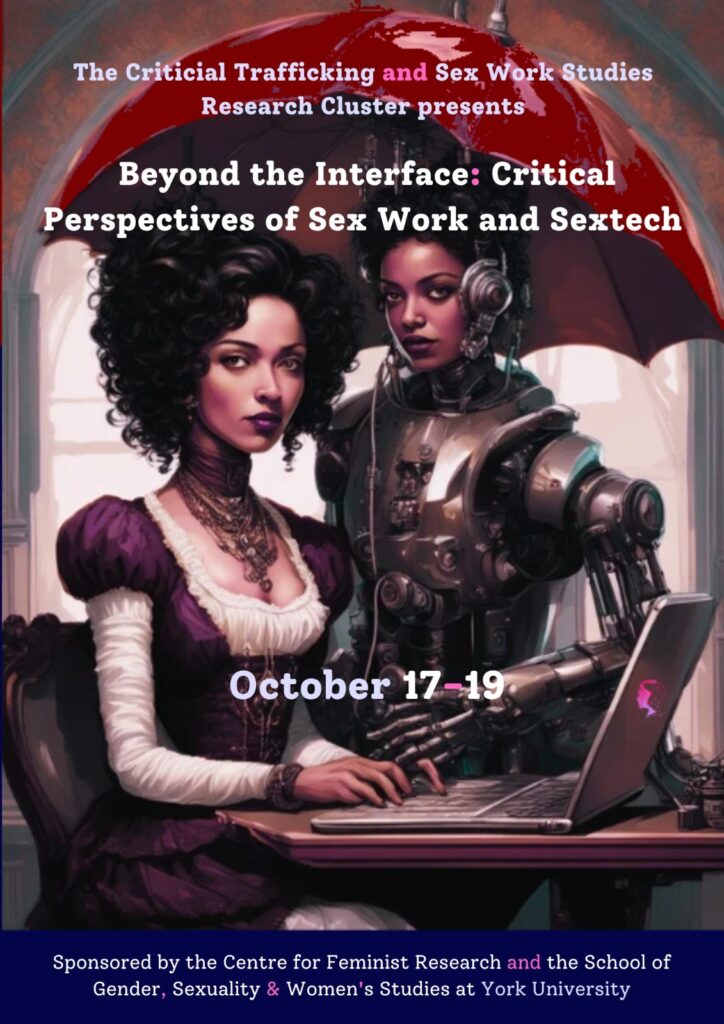
Straight Work Curious Support Group
Date: Tuesday, September 24, 2024
Time: 5:30pm - 7:30pm ET
Location: Virtual
Registration: https://yorku.zoom.us/meeting/register/tJAtf-ysqj0pE9c2G8HvLBmw3mx8uAe2X6Qe#/registration
This event was for sex workers only (inclusive of escorts, strippers, alternative/erotic massage providers, street-based workers, etc.). Registration was required to protect everyone’s privacy and support a safer space. It was hosted by Maggie's, Work Safe Twerk Safe, and the Critical Trafficking and Sex Work Studies Research Cluster in the Centre for Feminist Research at York University, and facilitated by a career stripper who was transitioning into nonprofit/legal clinic work.
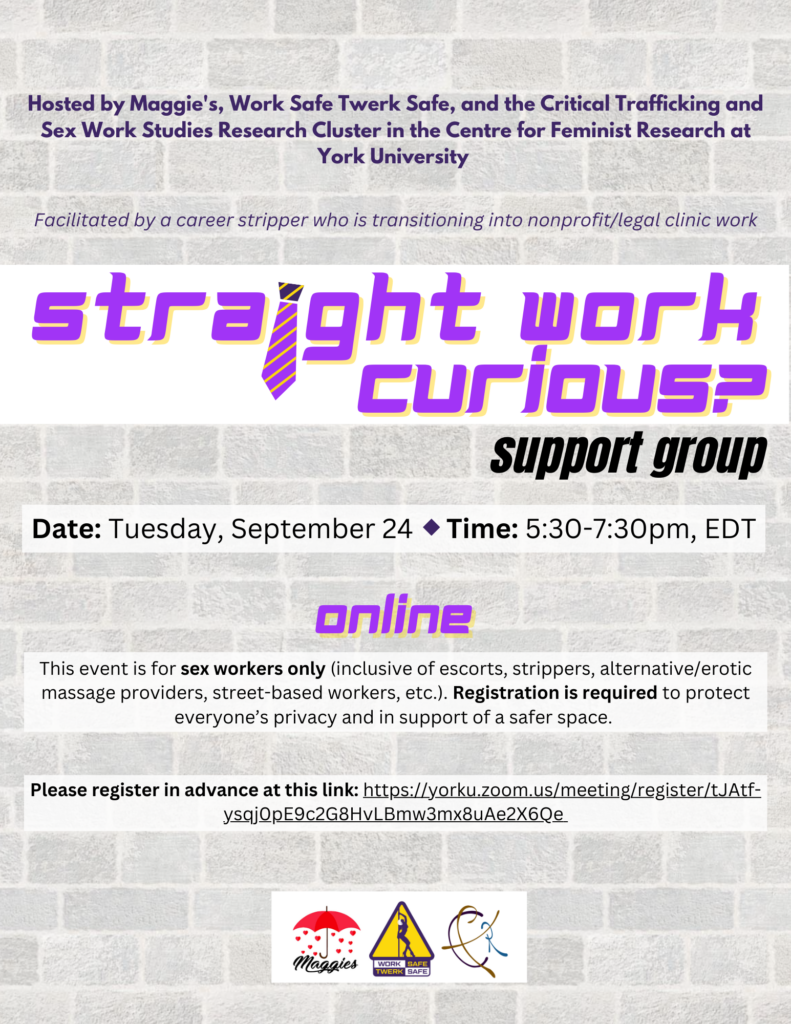
Critical Trafficking and Sex Work Studies Research Symposium
On November 18, 2023, we hosted the Critical Trafficking and Sex Work Studies symposium, bringing together sex workers, academics, activists and allies to discuss recent books, research activities, and mobilizing efforts in Canada and abroad. The event featured recently published academic works by Lyndsey Beutin (McMaster University/Princeton University), Kamala Kempadoo (York University), Elena Shih (Brown University), Juana María Rodrígues (Berkeley, University of California), Tuulia Law (York University), and Katrin Roots (Wilfrid Laurier University) in conversation with workers, activists, legal experts, and organizers.
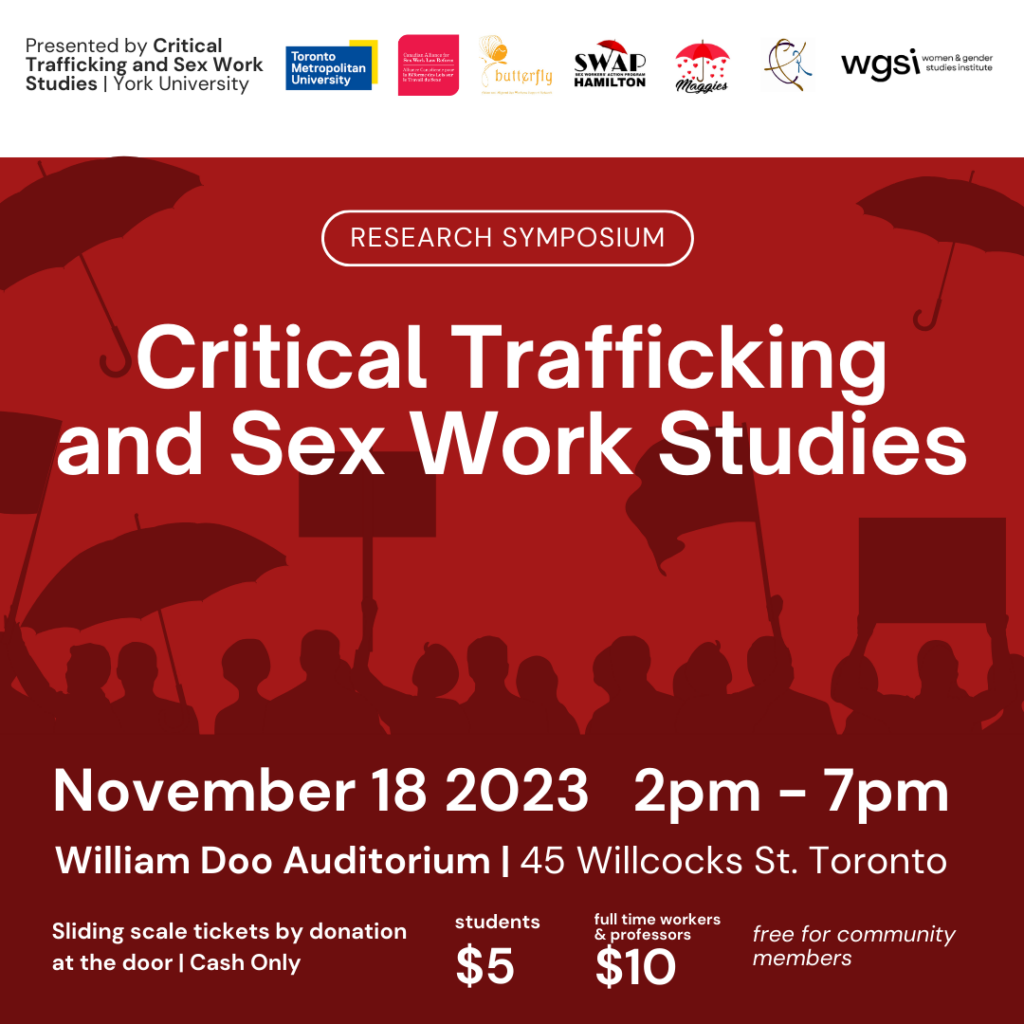
The Critical Trafficking & Sex Work Research Cluster Meet and Greet
On May 1, 2023, we hosted an informal coffee chat with sex workers, activists, artists, and academics that work in the realm of Critical Trafficking and Sex Work Studies. The afternoon allowed us to facilitate needed connections for research and other forms of straight work as well as more non-academic creative projects. We are incredibly thankful for the dedicated folks at York University and beyond that attended and were so generous with their expertise, experiences, and insights. With their support, we submitted a brief for the for the Study on Human Trafficking of Women, Girls, and Gender-Diverse People in Canada as commissioned by the Standing Committee on the Status of Women. Soon, our brief will be available in English and French on the Parliament of Canada website.
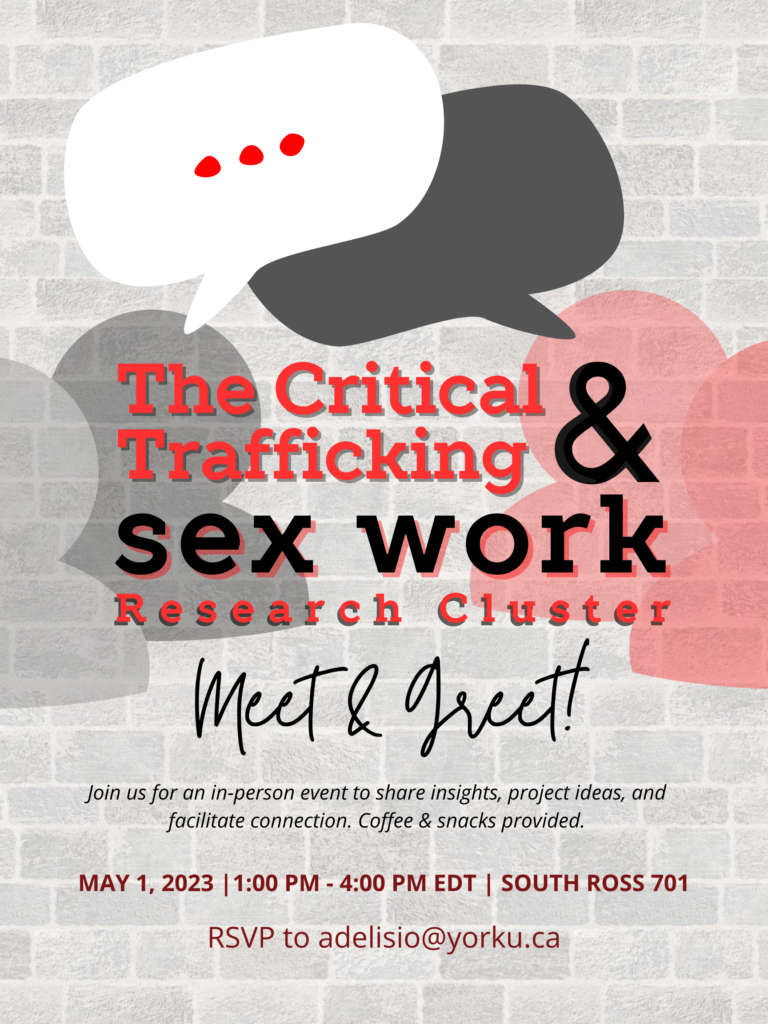
Sex Worker Justice: Student Solidarity and Action at YorkU
On November 21, 2022, the Social Work Student Association (SWSA) at York University, in collaboration with Butterfly: Asian and Migrant Sex Workers Support Network, hosted an event at Founder's Assembly Hall (Rm. 152, Keele Campus). The event welcomed members of the York University student population, staff, and faculty to listen to and learn from migrant and Asian women detrimentally impacted by the criminalization of sex work. Often portrayed as trafficked victim, migrant and Asian women spoke directly to their realities of stigmatization, discrimination, and state violence in the GTA. The event was well-attended with more than 50 students, predominantly from the Faculties of LAPS (Liberal Arts and Professional Studies) and Health.
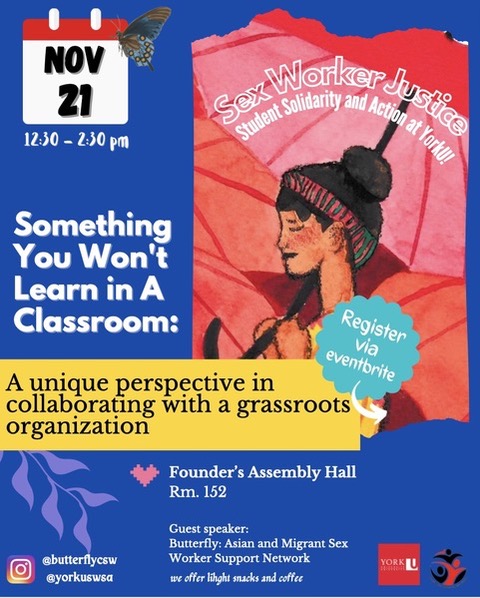
Book Launch: White Supremacy, Racism, and the Coloniality of Anti-Trafficking
On November 11, 2022, we proudly hosted the launch of White Supremacy, Racism and the Coloniality of Anti-Trafficking (edited by Kamala Kempadoo and Elena Shih) at the William Doo Auditorium (45 Willcocks Street, M5S 1C7). The book is available to purchase now at Another Story Book Shop.
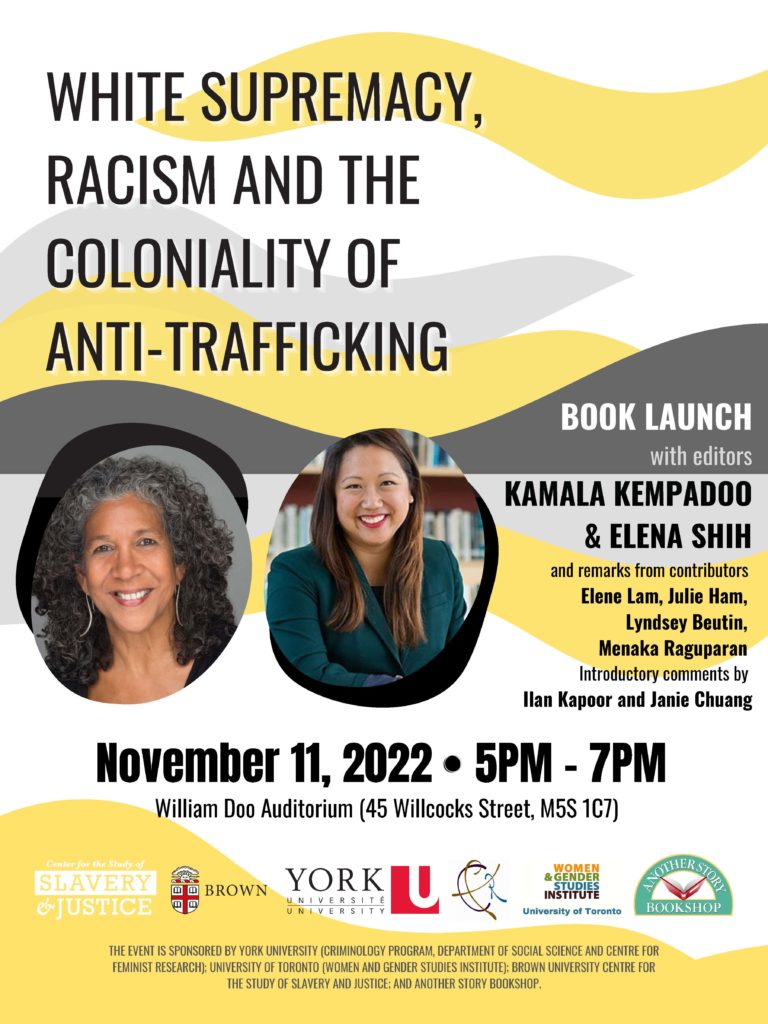
Municipal Bylaws and Anti-Asian Racism from Past to Present
On May 30, 2022, the Critical Trafficking and Sex Work Studies Research Cluster at the Centre for Feminist Research hosted an event to share insight and provide context to the recent implementation of a new accreditation process in the Town of Newmarket for people in alternative massage. To view the recorded panel and/or read a summary of the event, see Feminist Dispatch: Municipal Bylaws and Anti-Asian Racism From Past to Present.
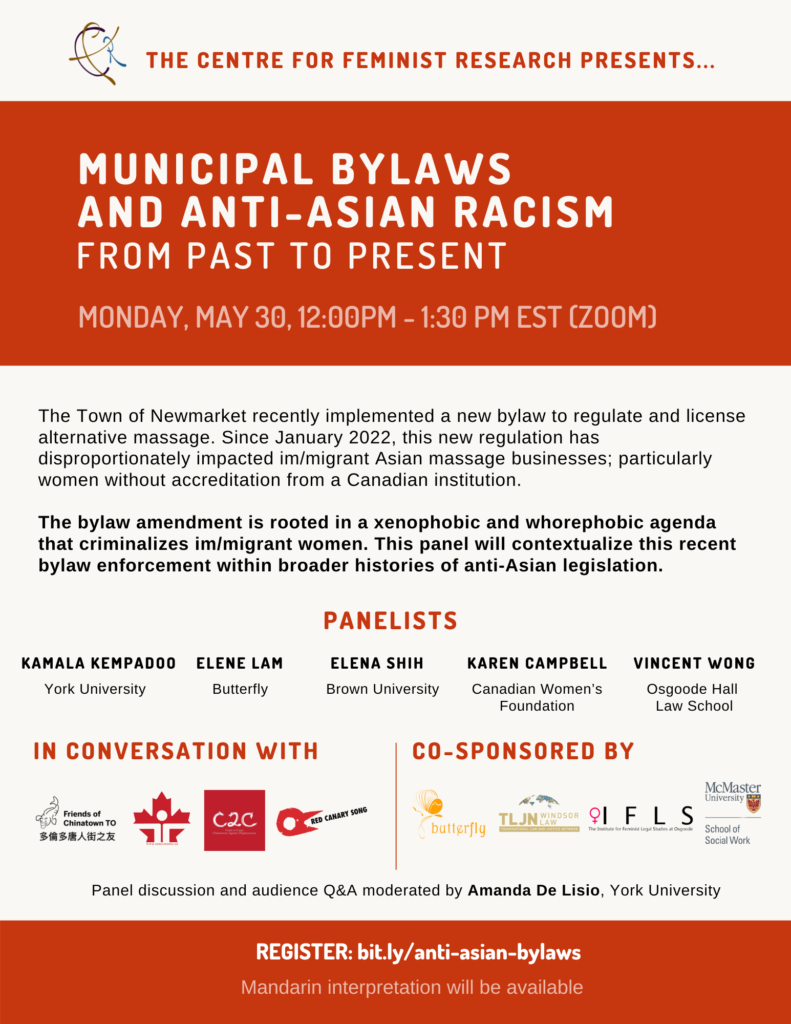
Beutin, L.P. (2024). "Beyond Carceral Humanitarianism: Antiblackness as the Structure of Anti-trafficking Discourse" In Trafficking Harms: Critical Politics, Perspectives, Experiences, edited by Katrin Roots, Ann De Shalit, and Emily van der Meulen, pp. 34–53. Halifax: Fernwood.
Gallant, C., & Lam, E. (2024). Not your rescue project: Migrant sex workers fighting for justice. Haymarket Books.
Ham, J. (2024). Hypersexualisation and racialised erotic capital in sex work. Culture, Health & Sexuality, 1-15.
Jezrawi R., Zahorka Derka S., Warnick E., Foley J., Patel V., Pavithran N., Bernier T., Wagner N., Barr N.G., Maccio V., Leyland M., Lokker C. (2024). Partnering with students to develop a capstone for a graduate health informatics program. Appl Clin Inform, 15 (5): 1080-1092.
Kempadoo, K. (2023, January 13). “Critical perspectives on human trafficking” Podcast. Center for Security Studies, Wilfrid Laurier University.
Lam, E., Wong, V.W.S, Chu S.K.H., Chan T.C., De Lisio, A. (2024). Weaponized Licensure: Asian Migrant Sex Workers’ Struggle Against Discriminatory Licensing in Newmarket, Ontario. Journal of Critical Race Inquiry 11 (2), 24-39.
Moira, A. (2024). Neca: romance em bajubá. São Paulo/SP: Companhia das Letras.
Moira. (2025). So what if I’m a puta: Diaries of transness, sex work, desire (A. De Lisio & B. D. Lobato, Trans.). The Feminist Press at CUNY.
Murray, L.R. (2024). "Puta Politics: The Innovative Political Theories and Protest Praxis of Putas." In P. Amar (Ed.), Rio as method: Collective resistance for a new generation, (pp. 323-333). Duke University Press.
Murray, L.R. (2023). "Justice through the erotic: Puta politics, knowledge and feminism as guides for how to move beyond binaries and destabilise contradictions." In P. Aggleton, R. Cover, C.H. Logie, C.E. Newman & Richard Parker (Eds.), Routledge Handbook of Sexuality, Gender, Health and Rights, Second Edition (pp. 459-446). New York: Routledge.
Muray, L.R. (2023)."Gestando vitimas e politizando proteção: notas etnográficas sobre um Estado que faz "direitinho" em contextos de prostituição." In A. Piscitelli & L. Lowenkron (Eds.), Tráfico de pessoas e contrabando de migrantes: entre leis, políticas e experiências, First Edition (pp. 163-194). Campinas: Cadernos Pagu.
O’Doherty, T., & Cherrington, K. (2022a). Commodified BDSM services: Professional dominatrices’ views on their work and its criminalization. Archives of Sexual Behavior, 52(3), 1285–1298.
Pietrangelo-Porco, E. (2024). "The Sex Work Historian." New Sociology: Journal of Critical Praxis, 5, 1-10.
Pietrangelo-Porco, E. (2024, November 19). Why Canada’s sex work legislation hasn’t changed (but should). Active History.
Prada, M. (2025). Putafeminista: A manifesto of sex worker feminism (A. De Lisio, Ed. & trans.). The Feminist Press at CUNY.
Püffel, M., Orbay, I., Salo, I., Burga, E.R., Bernier, T. (2024). “Sex workers can say no, too”: A systematic review on sexual violence in association with health in sex workers. DPK, 3rd German Psychotherapy Congress, Berlin, Germany.
Roots, K., De Shalit, A., & van der Meulen, E. (Eds.). (2024). Trafficking harms: Critical politics, perspectives, and experiences. Fernwood Publishing.
Ustundag, E. & Rose, D. (2024). Feminist methodologies for critical urban research: interrogating and reimaging epistemic justice. In Peake et al. (eds) Elgar International Handbook on Gender and Cities. Cheltenham: United Kingdom.
Zen, K., & Gallant, C. (2025, July 12). Sex workers are being abducted by ICE — and abandoned by respectability politics. Truthout.
Dr. Thérèse Bernier completed her doctoral studies at the University of Toronto in November 2022, where her dissertation focused on public health informatics, specifically, Canadian sex workers’ usage of information and communication technologies to assist in their occupational health and safety. Dr. Bernier obtained a SSHRC IDG grant in June 2023 for the research project “Sex work - the musical: altering societal perceptions of sex work through audience engagement with a musical play.” Dr. Bernier’s work has been published in several peer-reviewed publications. She has presented at, and organized, conferences.
Lyndsey P. Beutin is Assistant Professor of Communication Studies and Media Arts at McMaster University in Hamilton, Ontario. Her research focuses on the racial logics of liberal modernity, the memory of slavery, and contemporary social movements. She is the author of Trafficking in Antiblackness: Modern-Day Slavery, White Indemnity, and Racial Justice (Duke University Press, 2023), which won the Emerging Scholar Book Award from the Canadian Communication Association and the 2024 Shepherd Book Prize in the Humanities from McMaster. She has held fellowships at the African American Studies department at Princeton University and the Carter G. Woodson Institute for African American and African Studies at the University of Virginia.
Lindsay Blewett is a PhD candidate in Gender, Feminist and Women's Studies at York University. Her work examines embodied knowledge and practices generated by disabled sex workers about their work.
Kathleen Cherrington is a 5th-year PhD candidate at York University whose research explores the intersections of commercial sex, artificial intelligence, and digital technologies. Focusing on sex-positive feminism, she examines the evolving dynamics of intimacy, labour, and technology. Kathleen’s work bridges academia and marginalized communities, advocating for ethical engagement and equity in research. With extensive experience in community engagement, media outreach, and academic leadership, she is committed to mentorship, student advocacy, and fostering interdisciplinary dialogue. Her research and professional activities reflect a dedication to inclusivity, innovation, and amplifying underrepresented voices in both academic and public spheres.
Sylvie Côté (she/her/hers) is a PhD student at York University in the Gender, Feminist, and Women’s Studies program. Her research examines the relationship between substance use, addiction, and harm reduction in the Toronto EDM/rave community. She also explores romance, erotic literature, sex trafficking, and BDSM, focusing on consent, power, and agency in both real-world and fictional contexts. Finally, Sylvie's hobbies include flow dancing, painting, and hiking.
Amanda De Lisio is an Assistant Professor of physical culture, policy and sustainable development in the School of Kinesiology and Health Science and Executive Member of the City Institute at York University. Her research is predominantly focused on urban and health inequities in mega-event host cities. She previously collaborated with Coletivo Puta Davida in Rio de Janeiro, Brazil, to examine the impact of FIFA/Olympic construction on women and gender-diverse people in feminized, sexual labour. More recently, she is interested in feminist solidarities fomented in response to state violence and abandonment—namely, the collective action of women and LGBTQIA+ people in Rio de Janeiro and im/migrant Asian women in Toronto. Her work has been funded by the Economic and Social Research Council in England, Mitacs Canada, and the Social Sciences and Humanities Research Council of Canada, and published in academic and popular presses in English and Portuguese.
Ann De Shalit is an assistant professor of gender and social justice at Trent University. Her primary research uses labour and migrant justice approaches to expose the broadly defined impacts of anti-trafficking policy, discourse, and practice. She has also been involved in community-based research and campaigns in the areas of migration, sex work, precarious labour, and harm reduction. She is the co-editor of Trafficking Harms: Critical Politics, Perspectives, and Experiences.
Chanelle Gallant is an abolitionist feminist who has been fighting to free women’s sexuality from criminalization for over 25 years. She is a frontline organizer, writer, thinker, strategist and the co-author of Not Your Rescue Project: Migrant Sex Workers Fighting for Justice. Chanelle has contributed to dozens of influential publications including Pleasure Activism, Abolish Social Work (As We Know It), Disarm, Defund, Dismantle: Police Abolition in Canada and spoken everywhere from Princeton, Columbia and the London School of Economics to the UN Special Rapporteur and at thousands of organizing meetings and trainings. She is currently a visiting Activist-Scholar at the Centre for Feminist Research at York University, Toronto.
Chanelle cut her teeth fighting the cops as a core organizer in the historic fight against the Pussy Palace raid in 2000, and went on to found numerous sex work organizations and SURJ-Toronto. She now sits on the national board for multiple organizations in the US and Canada.
Dr. Julie Ham is an Associate Professor in the Department of Sociology at Brock University; Co-Chair of the Collaborative Research Network on Sex, Work, Law and Society (CRN6) in the Law and Society Association; and a Board Member for the Global Alliance Against Traffic in Women (GAATW) Canada. Her research is grounded in academic-community collaborations that speak to priorities identified by sex worker, migrant and minority communities, such as racial difference in sex work, harms produced by the anti-trafficking industry, and knowledge production and cultural production by migrants through participatory and visual methodologies.
Kamala Kempadoo is a Professor in York’s Department of Social Science, and a founding member of this research cluster. She has developed and taught courses in Sex Work Studies, Critical Anti-trafficking Studies, Caribbean Studies, and Black Radical and Black Feminist Thought and is a former director of the Graduate Program in Social and Political Thought. She has published extensively on the global and Caribbean sex trade and anti-trafficking discourses, including Global Sex Workers: Rights, Resistance and Redefinition (edited with Jo Doezema), Sexing the Caribbean: Gender, Race and Sexual Labour, and Trafficking and Prostitution Reconsidered: New Perspectives on Migration, Sex Work, and Human Rights (edited with Jyoti Sanghera and Bandana Pattanaik). She is the recipient of the Distinguished Scientific Award of the Society for the Scientific Study of Sexuality and the Lifetime Achievement Award from the Caribbean Studies Association.
Elene Lam is an activist, community organizer, educator, and human rights defender. She has devoted herself to organizing, defending the rights of, and empowering marginalized communities - particularly sex workers, migrants, and precarious workers - for over 20 years. She is the founder of Butterfly (Asian and Migrant Sex Workers Support Network) and has used diverse and innovative approaches to advocate social justice for migrant sex worker, e.g., leadership building and community mobilization. She has made transformative contributions to the migrant sex workers’ movement in Canada by being a unique and compelling player in sex worker rights, migrant justice, labour rights, and in gender justice circles. She holds a Master of Laws and Master of Social Work. She is the PhD candidate at McMaster University (School of Social Work) and studying the harm of anti-trafficking movement. She is also the recipient of Constance E. Hamilton Award for Women’s Equality (City of Toronto).
Tuulia Law is an Associate Professor in the Criminology Program at York University. She is also appointed to and supervises students in the Socio-Legal Studies, and Gender Feminist and Women’s Studies graduate programs. She has been involved as a researcher and member in various sex worker advocacy organizations for more than a decade; she currently works with a Toronto-based strippers’ social and advocacy group called Work Safe Twerk Safe. Her previous research has examined: third party work and management in indoor sex and adult industry venues; sex workers’ creative problem solving and security strategies; racialized, gendered and classed tropes of sex work and management. Her current projects explore stripper-management relations and tensions, and strippers’ engagement with provincial labour and human rights protection mechanisms.
Amara Moira is a travesti, feminist, PhD in theory and literary criticism with a thesis on James Joyce's Ulysses. She is also the author of (So What) If I'm a Puta?: Diaries of Transness, Sex Work, Desire (Feminist Press, 2025), where she writes about her experiences as a sex worker, and Neca: Romance em bajubá (Companhia das Letras, 2024), where she presents a literary monologue in bajubá, the language of Brazilian travestis. Currently she works as Coordinator at the Museum of Sexual Diversity, in São Paulo.
Sonja Moroz has a Bachelor of Arts (Honours) from Queen’s University, a Post-Graduate Certificate in Project Management from Humber College, and is currently pursuing the Fundraising Certificate Program at George Brown College. Her overall motivation in life is to support causes that help marginalized and vulnerable populations in Canada and around the world. Sonja has a strong passion for social justice work and is thrilled to be a part of the Beyond the Interface project team and supporting with its project coordination and fund development/fundraising. She has worked in these capacities for large organizations such as the UNDP Bangladesh and UNICEF Canada as well as local groups such as Rainbow Faith and Freedom (RFF), a grassroots organization that aims to end religious based LGBTQ2S+ discrimination, homophobia and transphobia. Her degree in Global Development Studies at Queen’s included a term at the University of Havana studying Cuban culture and development. She also completed a research program in Shanghai, China at Fudan University in the School of Social Development and Public Policy. Her research here addressed the systemic and political barriers faced by migrant workers integrating into Shanghai society. Sonja loves trekking; past highlights include Taktsang monastery in Bhutan and Tiger Leaping Gorge in Yunnan, China.
Laura Murray is a Professor at the Center for Public Policy Studies in Human Rights at the Federal University of Rio de Janeiro. Her research focuses on gender, sexuality, sex work, activism, and public health, and involves ethnographic, audiovisual, and archival methods. She is a member of the sex worker rights organization Coletivo Puta Davida and directed the short documentary film, A Kiss for Gabriela (2013).
Evania Pietrangelo-Porco (she/her) is a PhD candidate, sex worker ally/accomplice, trained historian, and blogger. She focuses on Canadian, feminist, North American Indigenous, and contemporary sex work history. Evania won the Joseph-Armand Bombardier CGS-Master’s Scholarship (2019) and the SSHRC Doctoral Grant (2022). She holds various professional affiliations, contributes to multiple journals, and has been published in New Sociology, Active History, Canada Watch, the Canadian Historical Association and the Journal of International Women’s Studies. Most significantly, Evania has worked with folks in the sex work community, including the BC Coalition of Experiential Communities (BCCEC) and Sex Workers Outreach Project LA (SWOP LA).
Chris Aino Pihlak (she/her) is a trans woman, PhD student at the University of Toronto, and social historian of past articulations of trans feminine existence. In addition to her interest in trans feminine porn studies, she is a scholar of twentieth-century, Anglophone trans feminine subcultures. Her work can be found, or is forthcoming, in the Journal of the History of Sexuality, Gender & History, Sexualities, and Intersections. She hopes her analyses of the complexities and messiness of past trans lives honours those who built the path she now walks on.
Sam Saunders is a PhD candidate at the University of Essex’s School of Philosophical, Historical and Interdisciplinary Studies (PHAIS). Her research centres on sex workers’ rights and critical visual theory, examining how advertisements produced by sex workers can challenge existing narratives about the sex industry, their (mis)representation and lived experiences. Her methodological framework adopts critical visual analysis and feminist theory to locate agency in sex workers' self-promotion as a marginalised community in British culture. In addition to her research, she has delivered modules on Feminist Debates and Activism, and Sexuality and Social Control at Anglia Ruskin University (UK).
Soma Snakeoil is Executive Director and Cofounder of The Sidewalk Project, a lived experience harm reduction organization with chapters in several cities, including a mobile SSP and a day center for cis and trans women in Skid Row. She is an artist, activist, Dominatrix, and playwright.
Soma’s passion for the houseless community comes from lived experience as a long-term former PWUD, being unhoused, and almost 20 years of the spectrum of sex work, including survival sex. Soma is a survivor of SA, IPV, and narcisstic abuse from a public figure. She uses her personal experiences to inform deep advocacy for sex workers, drug users, and survivors and their intersecting issues. Soma sits on multiple LA County steering commitees, including being a founding member of the 4 for 4 Collaborative that works to address Category 4 of HUD’s designation of homelessness, sits on the California Syringe Program’s Steering Committee, and is a frequent guest speaker lecturing on harm reduction at UCI, UCLA, USC, Occidental College and Mount St Mary’s. Soma and The Sidewalk Project participated in the 2022 LA County Women’s needs assessement led by DWC and championed by LA County Supervisor Hilda Solis. One of her primary focuses is on gender-based violence, sex worker liberation, and the feminization of poverty.
With Soma's leadership The Sidewalk Project is engaged in a four-year research project with York University out of Canada to track the experience of street based sex workers and survivors in Los Angeles ahead of the upcoming Olympics and the preceding gentrification efforts and police operations.
Ebru Ustundag is a critical feminist geographer interested in the intersections of health care and social justice. She is an Associate Professor of Geography at Brock University (Ontario, Canada) and a graduate faculty member in the interdisciplinary Social Justice and Equity Studies MA program. Ebru is a co-chair of the Graphic Medicine International Collective executive board and co-editor of the journal ACME: International Journal of Critical Geographies.
Emily van der Meulen is a professor of criminology at Toronto Metropolitan University, where she conducts research on the criminalization and stigmatization of sex work, the effects of anti-human trafficking policy and policing, and prison harm reduction and drug policy. She has facilitated numerous studies and has published widely in these areas. Her most recent co-edited books include Trafficking Harms: Critical, Politics, Perspectives, and Experiences (2024); Disability Injustice: Confronting Criminalization in Canada (2022); Making Surveillance States: Transnational Histories (2019); and Red Light Labour: Sex Work Regulation, Agency, and Resistance (2018).
Jelena Vermilion (she/her) is the Founder and Executive Director of SWAP Hamilton; the recipient of both the Jose Julio Sarria Civil Rights Award as well as the YWCA Women of Distinction award this year. A sex worker and advocate of over a decade. Jelena has been featured in several national media outlets advocating for the decriminalization of the sale/trade of sexual services and the repeal of PCEPA / Bill C-36
Jelena provides professional best practices workshop trainings and public speaking engagements for organizations and agencies who wish to affirm the rights and dignity of sex workers. Jelena also advocates more broadly for marginalized women, intersex and non-binary folks, particularly those living with or at risk of contracting HIV. She is a consultant with Trans Pulse Canada and has helped co-author academic articles and research reports for community members and policymakers.
Vincent Wong is an Assistant Professor at the University of Windsor Faculty of Law. Professor Wong’s research focuses in law and political economy – specifically at the nexus between migration, race, markets, and the law. He is particularly interested in how a Canadian context-specific critical race theory (CRT) can better inform and be informed by the practice of anti-racist and intersectional lawyering.
